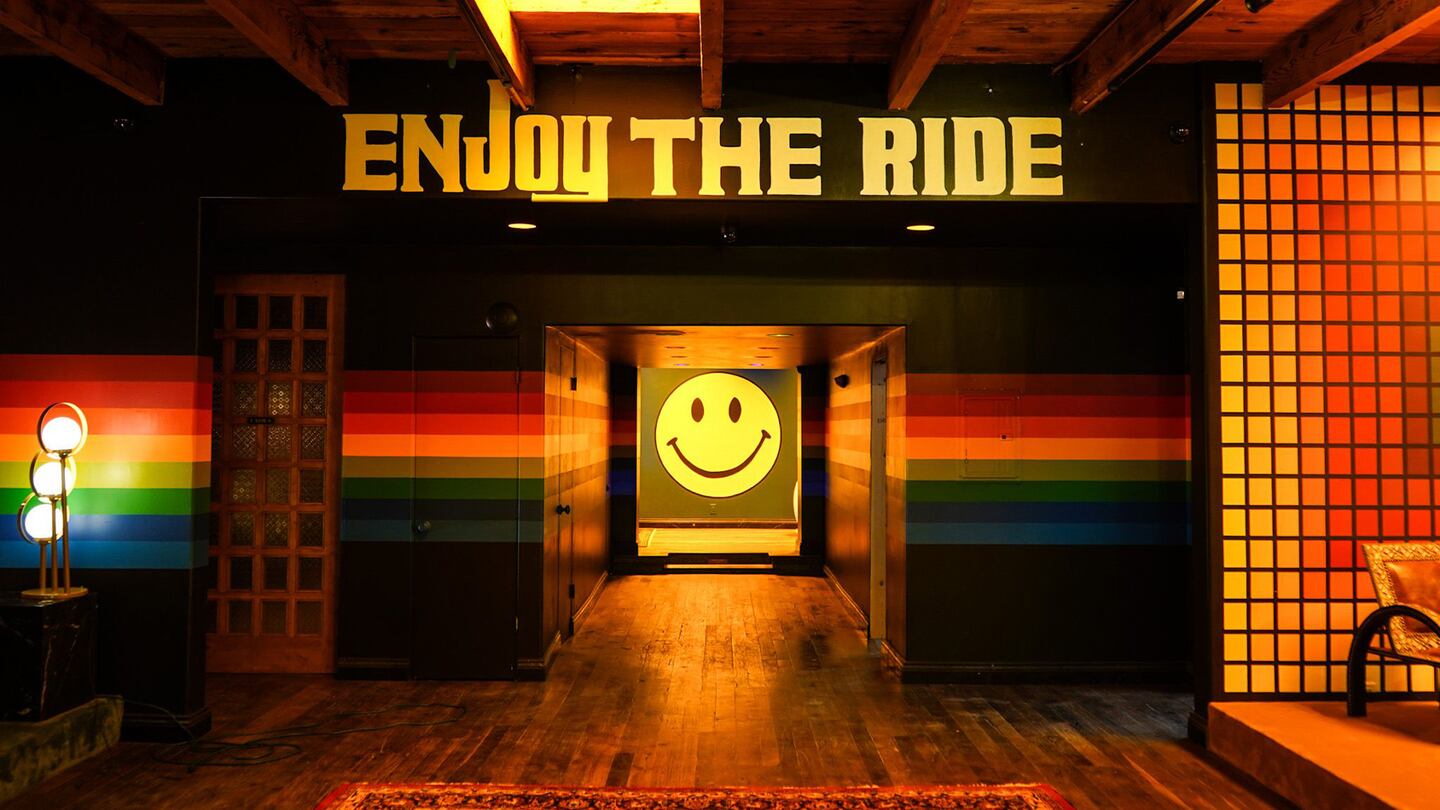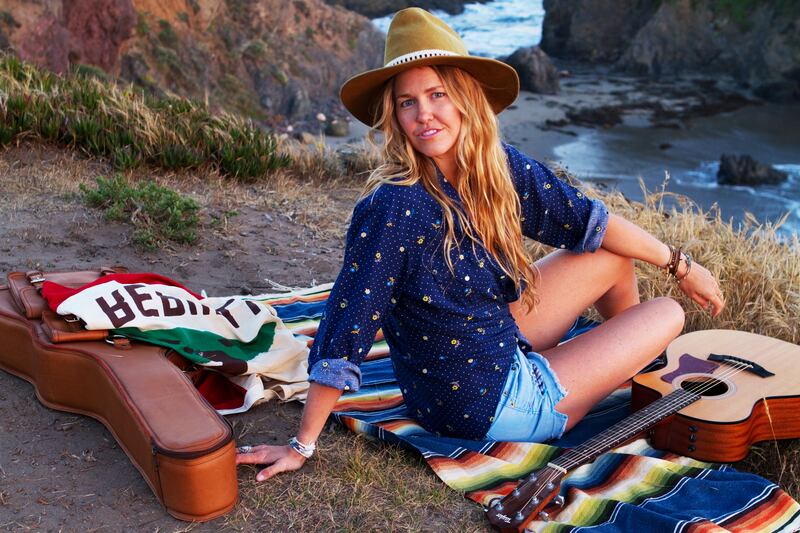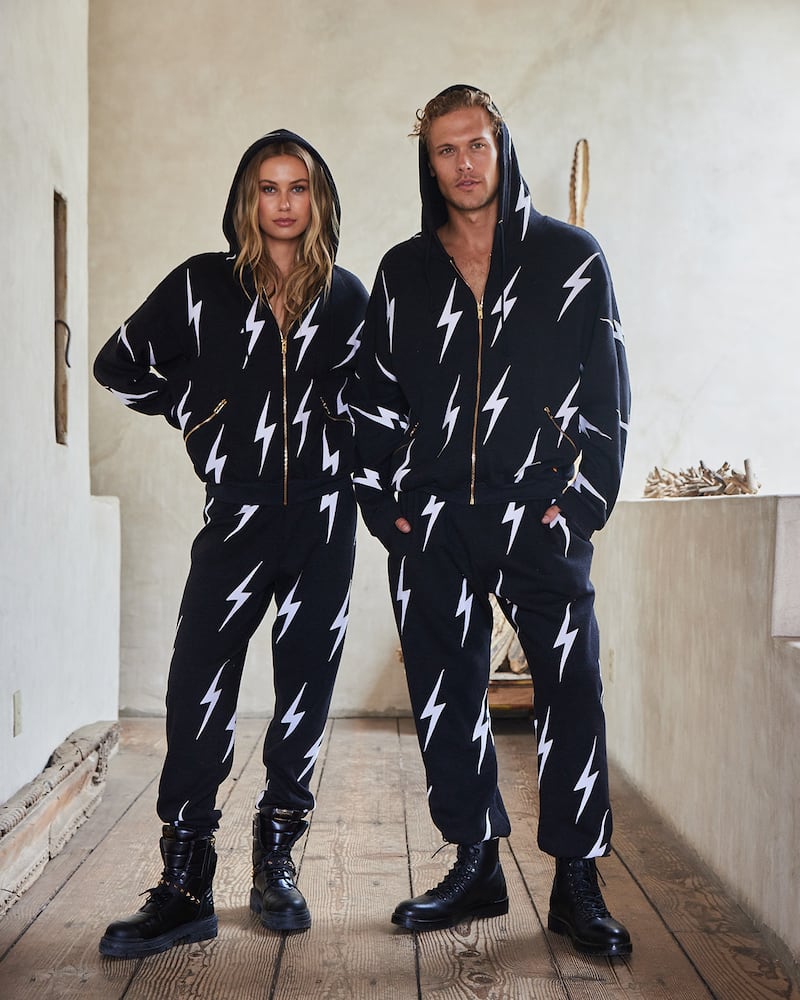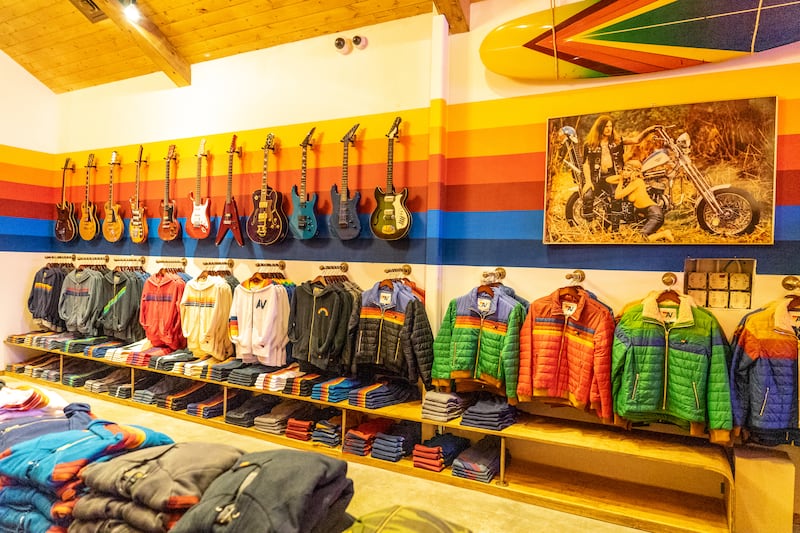
The Business of Fashion
Agenda-setting intelligence, analysis and advice for the global fashion community.

Agenda-setting intelligence, analysis and advice for the global fashion community.

Dr. Courtney Campbell, a veterinarian who serves as an onscreen pet expert for Good Morning America, was strolling down Santa Barbara’s bustling State Street Promenade when he noticed many pedestrians wearing the same sweatshirt — deliberately faded, with five rainbow stripes and a gold-tone zipper. As an East Coast native easing into California style, Campbell was intrigued.
“Everyone wearing them looked so relaxed and polished — like they sold their tech company and became a surfer,” he said with a laugh. “Some had beautiful French bulldogs. I was like, ‘That breed is so trendy right now. Those hoodies must be, too.’”
Dr. Campbell had entered the land of Aviator Nation, a haze of sea foam and vibes where cotton is pummeled to optimum softness, and smiley faces and hand-stitched rainbows confirm the luxury of belonging. Created in 2006 by a Texas-born reality television veteran named Paige Mycoskie, the brand is anchored in the famously chill surf scene of Venice Beach, California, though today it blares its motto (“Live. Love. Fly.”) at its boutiques in enclaves from Malibu to Aspen, and at Nordstrom, Bloomingdale’s and other retailers from coast to coast. It’s a world with steep cover charges for entry: Aviator Nation’s signature sweats cost about $180; the brand also makes tees, swimsuits, outerwear, and cashmere, with most priced between $150 and $500.
Though it’s been a sleeper hit with wealthy Malibu kids for years, the brand truly skyrocketed in 2020 when stay-at-home shoppers suddenly needed couch clothes that also looked cute on Instagram. After posting $27 million in sales for 2019, Aviator Nation nearly tripled that figure to $70 million in sales in 2020.
ADVERTISEMENT
Plenty of other brands followed a similar trajectory selling comfortable clothing at premium prices early in the pandemic. But unlike the now-defunct Entireworld or countless cooling athleisure brands, Aviator Nation just keeps getting bigger. Sales hit $110 million in 2021; last year, they rose to $130 million. Mycoski told BoF she’s expecting between $150 million and $200 million in revenue in 2023.
The brand is also profitable, and has been since its second year. Mycoskie, who remains Aviator Nation’s sole shareholder, credits her brand’s success to its origins outside the fashion system: Though the company now has 582 employees, it started as a one-woman show in Mycoskie’s garage.
“My overhead was very low in the early years and I was always sure not to spend more than I was bringing in,” Mycoskie said. (She has never taken outside investment; she considers Nov. 29, 2019 Aviator Nation’s first day of “true profitability” because “that’s the day I paid off all my debts and credit lines.”)
Still, hundreds — if not thousands — of other brands sell expensive sweats and cashmere. Why has Aviator Nation succeeded where so many others proved to be a pandemic flash in the pan?
“I think their secret sauce is really how they’ve harnessed the magic of a certain type of California star power,” said Bonnie Morrison, a strategic marketing and communications advisor who served as Coach’s vice president of public relations for five years. “To me, it harkens back to Jennifer Aniston’s maharishi pants and white tank top in the 90s. In Hollywood, dressing down became a kind of flex … You would be so famous you didn’t have to conform to any dress code … you don’t need to wear the trend because you, as a star, are the trend.”
In 2002, Mycoskie competed on The Amazing Race with her brother, Blake Mycoskie (they placed third; he went on to found Toms Shoes). The experience was formative.
“It made me so tough,” she said. “They gave us a teeny budget. We were trying to survive off very little food, sleeping on the street, or once in the jungle in Brazil … I realized I could get through anything, and that’s helped me every single day of running Aviator Nation. Business is hard and scary. But not terrified-in-the-jungle scary.”

Mycoskie moved to Los Angeles, where she worked for a time helping the CBS casting department select contestants on Survivor. Her career in fashion began when she needed a hoodie.
ADVERTISEMENT
It was 2006, the height of The O.C. ‘s sun-streaked emo reign, and Mycoskie stitched rainbow stripes onto her sweats, then dyed and distressed them in her kitchen sink. As she ran errands in her adopted hometown of Venice Beach, Mycoskie — sporty, blonde, and radiant — was the perfect ambassador for her accidental brand. People asked, “Where’d you get that outfit?” enough times to imply she could be onto something.
“Growing up, I was obsessed with 70s skater style,” she said. “I loved flared jeans and checkerboard Vans. I thrifted them in Texas … My grandmother taught me to sew as a kid, but I didn’t as an adult until I wanted a 70s sweatshirt and couldn’t find one.”
After inventing a name — “Aviator Nation” after Top Gun’s fighter pilot style — Mycoskie rented a Venice street fair booth for $500. She made $8,000 by lunch. Small orders from trend launchpads Fred Segal and Planet Blue followed and Mycoskie opened an online store, shipping clothes from her garage. Each piece came with a note still printed inside her hoodies today:
“This garment is rad. I know because I made it... There is one problem I must warn you about: People will come out of nowhere and want to know who you are. I suggest not wearing it in a crowded place unless you have a couple bodyguards; then it’s probably ok, and if you’re already famous and wearing this garment, you will more likely become super famous.”
In recent years, Jared Leto, Kate Hudson, Ben Affleck and Selena Gomez have worn Aviator Nation, along with thousands of ordinary customers who aspire to dress like them.
That dynamic plays out on the brand’s Instagram, an endless parade of models on seaside walks and coffee runs. The scenes are copied in real life (and then, like a fashion funhouse mirror, reposted on Instagram) by micro-influencers like Trista Giuntoli, who includes affiliate links to buy the same Aviator Nation merchandise worn by her family in various posts.
“I bought one sweatshirt, then never stopped,” said the Washington native, whose family wore Aviator Nation in their Christmas photo. (She purchased the items herself.) “I loved that they were made in the US and truly cared about how the product was produced.”
Aviator Nation went from a cult label to a household name in 2020, when “dopamine dressing” became a major market driver, bringing candy-colored hues and soft, oversized shapes to stressed millennials suddenly working from the couch.
ADVERTISEMENT
Among the victors were Justin Bieber’s smiley-face streetwear for Drew House, Selkie’s Candyland dresses, and Rachel Comey’s swirly knits for Target. Aviator Nation’s cozy fabrics and surf graphics fit right in. After investing profits back into the company for more than a decade, in 2021, Mycoskie took her first-ever dividend, for $47.5 million.

Previously, Mycoskie had taken a slow-and-steady approach, with small production runs and a gradual expansion of its store network (the brand has 16 retail locations, from second-home havens like Marin County and Aspen to emerging tech and cultural hubs such as Austin; each is designed, and even painted, by Mycoskie herself).
She could also look to her brother to see how the alternate path can play out. Mycoskie admits she’s competitive with her brother in career matters, “though I think we’ve done our own thing right from the beginning,” she said. Tom’s was almost an immediate phenomenon. In 2010, Blake Mycoskie sold a 50 percent stake in his company to Bain Capital, taking a reported $300 million to step back from a brand, which some analysts believe grew too fast. The brand was acquired by its creditors in 2019.
“People said I should design for another label instead,” she said of her early days in fashion. “Then when we got bigger, they said I should license out [our] name… manufacture overseas instead of in LA … Where would we be if I took that advice?”
Morrison says what makes Aviator Nation stand out in such a crowded leisurewear marketplace is combining that star power with the 70s surfer vibes that Mycoskie once hunted for in thrift stores, before even visiting California.
“The Malibu angle and Venice Beach angle is very cool, because it grounds the identity of the brand in something real,” she said. “Hippie surf California was a time that actually happened. Venice Beach and the Malibu shore are places that actually exist.”
That out-of-time vibe has been challenged over the years, especially in the wake of the protests against racial injustice in the wake of George Floyd’s murder in 2020. Brands and their founders faced considerable pressure to express solidarity with the Black Lives Matter movement and engage more meaningfully in social justice work.
In June 2020, Mycoskie posted an image of two hands—one with darker skin, one lighter—and the caption UNITE: Black Lives Matter to Instagram and Facebook. That same month, she appeared in a Los Angeles Times story as an “LGBTQ mover and shaker” telling the newspaper, “It’s time to be out, loud and proud of who you are, regardless of your skin color.”
Beyond these hints at solidarity with progressive causes, Mycoskie declines to endorse or denounce any political affiliation, sticking mainly to broader messaging around female empowerment, or collaborating on merchandise for the Global Citizens Festival, a celebrity concert series that raises money to fight extreme poverty, distribute anti-malaria drugs and other broadly popular causes.
“Everyone has a right to their voice,” she said. “I don’t want to shut anyone out. I want them to come together.”
Aviator Nation hasn’t been able to stay entirely above the fray. The brand has been called out on social media for marketing imagery that overwhelmingly features thin, blonde models. And in February of 2022, the company faced further scrutiny over its incorporation – its critics say appropriation – of Indigenous motifs on moccasins and tees, including a branded tipi.
“We love and respect the Native American culture,” Mycoskie told Forbes in a statement. “I have many friends and employees who are descendants of the Native American culture, and my goal will always be to not only respect these other cultures but celebrate them.”
The motifs are no longer used in any Aviator Nation merchandise or promotions.
Mycoskie’s unwillingness to wade into the discourse doesn’t appear to have affected sales. If anything, Aviator Nation’s constant serenity in the face of the country’s bitter division is part of the brand’s appeal, softening its fans’ anxieties like a Pacific wave that smooths down a sharp rock.
Or, its critics might say, the brand is catering to Americans — particularly affluent ones — who seek a permission slip to opt out of reckoning with the full weight of America’s history of racism and inequality. If one of the most successful women in American business can zap away identity politics with a beautiful beam of California sunshine, some take that as a sign they can do the same.
We’re all rad here, after all, and it only costs a premium hoodie to belong.
Like young adult dystopian novels and online role playing games, fashion brands need “world building” — a universe of their very own creation — to succeed. Last year, Mycoskie expanded into lifestyle spaces, creating Aviator Nation Dreamland, a concert venue, bar, and café in the storied Malibu Inn. There’s also Aviator Nation RIDE, a fitness studio in Santa Monica for cycling and yoga.

By the end of 2023, Aviator Nation expects to open stores in Nashville and New York, along with the potential for two others, and is mulling expansion into sneakers, home goods, and pet accessories. (Mycoskie recently adopted a puppy named Jagger as the newest member of the Aviator Nation team.)
Mycoskie is also considering a return to her TV roots – reluctantly of course.
“We get approached a lot to do a reality show,” she said. “I’ve always said no. I do not want to be a TV star but I do want our story out there, so we’re filming almost everything we do now, just in case. I really want to show the little girls out there how to lead a business. So we’ll see.”
For up-and-coming brands, a few small, cleverly designed stores in the right locations can have a bigger impact than a giant flagship
At a time when many online brands are pivoting to wholesale or opening stores, the womenswear label Ayr sees a future in the old e-commerce model.
As spending patterns shift, a new generation of mid-market American labels are thriving by offering value-conscious products with a point of view. Can they scale like the titans that came before them?
The company, under siege from Arkhouse Management Co. and Brigade Capital Management, doesn’t need the activists when it can be its own, writes Andrea Felsted.
As the German sportswear giant taps surging demand for its Samba and Gazelle sneakers, it’s also taking steps to spread its bets ahead of peak interest.
A profitable, multi-trillion dollar fashion industry populated with brands that generate minimal economic and environmental waste is within our reach, argues Lawrence Lenihan.
RFID technology has made self-checkout far more efficient than traditional scanning kiosks at retailers like Zara and Uniqlo, but the industry at large hesitates to fully embrace the innovation over concerns of theft and customer engagement.